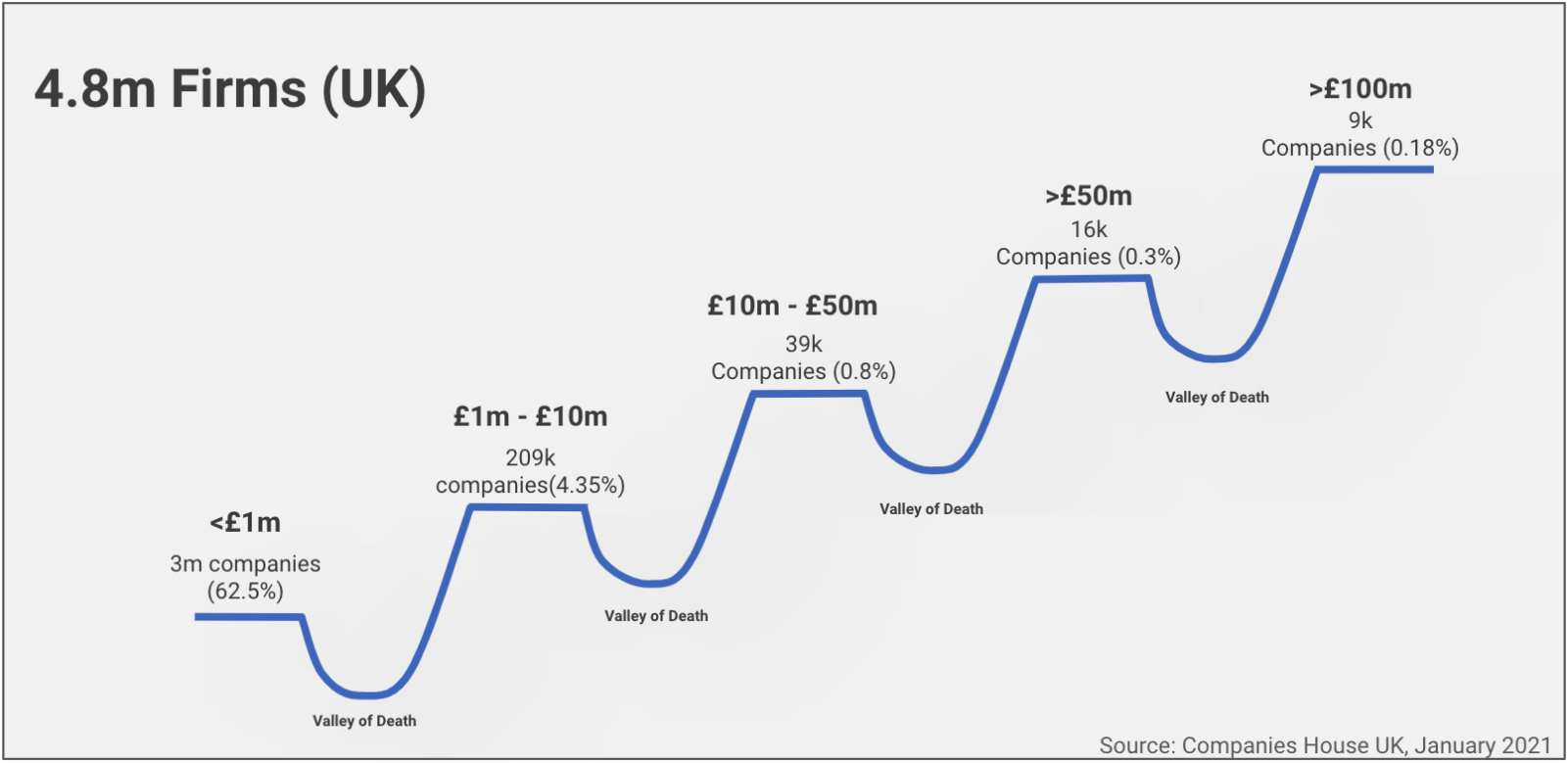Let me ask you this. Do you feel stuck? Like all the fun’s gone out of work? Is profitability dropping? Have your staff got lazy and stopped washing up their mugs? All of these are tell-tale signs. Ignore them at your peril.
You’ve hit an inflection point – something that happens to all businesses as they grow. You may feel completely alone but many of the clients we coach are stuck in the same position. They call us for help, some in desperation. I’ve had CEOs in tears on the phone, telling me they can’t carry on much longer for the sake of their mental and physical health. Only last week I talked to a potential client who was at their wit’s end. They needed to change everything before the business killed them. This is exhausting and debilitating stuff.
Knowledge is power. If you know what to expect, you can plan for these scenarios before they happen. Because one thing’s certain. They will happen.
Pattern matching
People often ask me what we do. My reply often surprises them. Pattern-matching. That’s it. For the last eight years or so, we’ve coached clients in different sized businesses, all of whom are growing fast. And they all hit the same challenges. But growth isn’t linear. It’s exponential. And the challenges come thick and fast if you’re not ready for them.
Early on in our relationship, CEOs will give me an overview of their business. How many staff, turnover, sector etc. And like mystic Meg, I can then predict exactly which problems they’re facing. ‘Is such and such happening?’ I ask. ‘Yes – how on earth did you know that?’ they reply. ‘And this, and this and this?’ I go on. ‘My God – how can you tell?’ It’s because I’ve been there. I’ve scaled two UK businesses from zero revenue to £30 million in 5 years. And we hit many of the issues our clients are facing.
Here’s a small example. At around 30 employees, we found people stopped putting their cups in the dishwasher. There was a general and discernible drop in personal responsibility. It drove me mad. It’s a small thing but the number of conversations we had about this behaviour at management meetings was crazy. Man, it’s frustrating!
Lowering accountability levels as companies grow
Ever heard the story about ‘Everybody, Somebody, Anybody and Nobody’? It goes something like this. ‘There was an important job to be done and Everybody was sure that Somebody would do it. Anybody could have done it, but Nobody did it. Somebody got angry about that because it was Everybody’s job. Everybody thought Anybody could do it, but Nobody realized that Everybody wouldn’t do it. It ended up that Everybody blamed Somebody when Nobody did what Anybody could have.’
The message is clear. No one took responsibility so nothing got done. It reminds me of my chat with Simon La Fosse from Fosse Associates for my Melting Pot podcast. His business had grown to the size where people were behaving more like renters and less like owners. And who’s ever washed a rental car?
It’s blindingly obvious when companies hit this inflection point. I used to be an assessor for a Customer Service award so visited a variety of businesses. I’d arrive in their meeting room and see a whiteboard marker that didn’t work. And broken chairs. Or a light that was out. And it told me all I needed to know about them. They’d got to the point of growth where nobody cared enough to sort these things out. I’m sure it hadn’t always been that way.
Human complexity and Dunbar’s research

Here’s the thing. At predictable points in your growth journey, stuff is going to break. Systems and processes that have served you well for years just won’t work anymore. It’s not anybody’s fault. It’s a fact of life. You didn’t have to think about the mess in the kitchen in the past because people cleared up after themselves. You hired people who just did these things. Or there would always be coffee because someone would notice you were running low and order some more.
At these points of inflection, profitability takes a dip. And they’re mainly driven by human complexity. According to Prof Robin Dunbar of Oxford University, the human mind is only capable of handling around 150 relationships simultaneously. As companies get bigger than 100, it’s impossible for one person to know everyone individually and understand where they sit in relationship with each other. This is when passengers appear – no one knows what these people do or can hold them to account. So Dunbar’s hypothesis is you should build business units of no more than 100 staff to add value to particular customer cohorts.
W.L. Gore & Associates, the manufacturers of Gore-Tex, run their business on this principle. When a division expands beyond 150 staff, they feel there are diseconomies of scale. So, they split into two smaller divisions. They believe it makes for better communication and a more efficient business.
Mikitani’s Rule of 3 and 10
I’m intrigued by heuristics that add perspective to any topic. Another that’s relevant here is Hiroshi Mikitani’s ‘Rule of 3 and 10’. Mikitani founded Japan’s largest eCommerce retailer – a business that expanded rapidly and exponentially. As they hit certain points, he noticed that systems and processes started to break. And when he stepped back, he realised these things happened at multiples of 3 and 10. Interesting observation and one I agree with from my own experience.
You build a business and there’s three of you. At ten people, everything changes. You get to thirty people and it changes again. Same when you hit 100. At every one of these steps, everything breaks – communication systems, payroll, accounting, customer support. Formal processes need to be reviewed and restructured.
At thirty people (or £3 million turnover), you’re going to need a leadership team. At 100, the CEO needs to give up their functional role and become a full-time CEO. It’s important to know that these inflection points are coming and plan accordingly.
The growth trap

Businesses get stuck when they haven’t planned ahead. They find themselves in a no man’s land where they’re sinking more and more investment into the company with no return. Some are founder-led with a turnover of £1.5 million and 10 to 15 staff. Others are bigger with a management team and turnover approaching £100 million. What unites them all is they need to get out of the trap before they can re-gain forward momentum.
Some can be stuck here for five years or more. That’s a long time to be treading water. They’ve no idea what things will look like on the other side. How could they? They’ve never done this before. And they don’t have the money to invest to get there. Forewarned is forearmed. If you plan ahead, you can avoid the trap.
Planning for role changes
As CEO, are you currently managing your business as a hub and spoke? Then you need to put plans in place to evolve out of your functional role. When you get to the 100 staff inflection point, the quality of your leadership team is going to become critical. It’s often the point when the Founder leaves because they can’t give up their functional responsibility or they don’t believe they can lead the team forwards. Perhaps someone else with the right skills takes the role of CEO. If you have a plan, this evolution can be much less traumatic.
Work out where you are currently, where you want to get to and when you’re likely to hit the chasm of unprofitability. Look at the age of your founders. Will they want to exit or do less in the future? They may not want to run the company longer term. Are you planning to sell the company? This will also impact your M&A strategy. If you’re stuck in a growth trap, don’t make the mistake of buying another company to try and get out of it. You’re just increasing human complexity and making the problem even worse.
Radical candour about the future
Get used to having open and honest conversations about the future. They could serve you well when you hit inflection points. Be realistic about what growth is going to mean for you and the rest of your Executive team. Here’s a footballing analogy. You’re playing for a team that’s in Division 3. The team gets bought by a Saudi billionaire with designs on winning the Premiership. That’s a fantastic BHAG but let’s face it. Very few of the players who are currently on the field are going to be there for that winning Premiership match.
The same goes for a growing business. Get real. Some people will have the skills to ride the wave. Others will get off. Creating a culture of radical candour could be useful. I’ve seen organisations where individuals are failing but feel unable to ask for help. They just get swept away. If you’ve created an open and honest culture, people can admit they’re not sure the job is right for them. They can work out where their skills lie to find the right role. Then, rather than getting into a bad place, failing and getting fired, they’re in a job that works. Without radical candour, these transitions can be unnecessarily traumatic. Plan now, speak openly and honestly and you’ll avoid damaging your own and your team’s mental health.
Ultimately, if you’re stuck in a hole, know that it’s not your fault. It’s normal for things to break at certain points on your growth journey. It’s not that you’ve managed things badly. Growth is accelerating these changes. Spot the warning signs, recognise that you’re hitting an inflection point and make a plan. Then you can ease growing pains before they overwhelm you.
Written by business coach and leadership coaching expert Dominic Monkhouse. Contact him to schedule a call here. You can order your free copy of his book, Mind Your F**king Business here.

